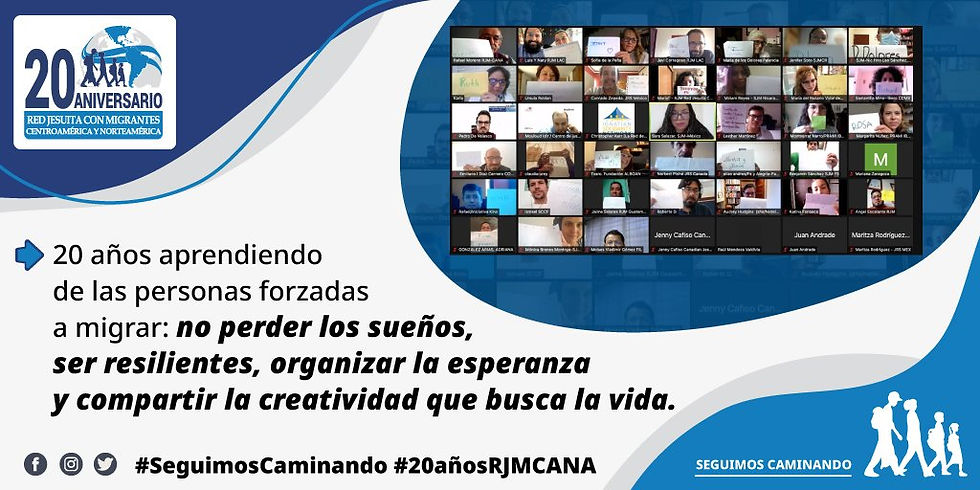XX RJM CANA ASSEMBLY | Don't lose dreams, be resilient and pursue life with creativity.
- Red Jesuita con Migrantes
- 23 nov 2021
- 3 Min. de lectura
Between November 16 and 19, the CANA region of the RJM met for its 20th assembly. Two observations presided over the conversation: 1: Forced migration in the region presents the image of a dead end, based on a greater need to migrate due to the growing and complex operation of the causes, and a decreasing possibility for reception, protection and access to rights, due to more restrictive policies and a social climate in which rejection and fear of migrants is fostered; 2: Our mission as a network continues to be to organize hope. And that was the task of the more than 60 people from different works that we met last week, to analyze together the migratory reality in a comprehensive manner, to measure our capacities (our own and those of existing and potential alliances) and based on that, with a clear defense mission, to design priority actions for 2022.

The analysis of reality led to some considerations:
The need to denounce the contradiction between political practices and discourses in the region.
We define migration policies as harmful not only because of their containment character, but also because they do not solve the underlying problems. Migration continues because the causes continue to expel people.
We have seen the abandonment of the asylum systems in the region, which are undergoing a profound crisis.
Democratic weakness, economic crisis, corruption, generalized violence, attacks against the common home continue to operate and worsen as causes, while the plans to confront them suffer from inefficient formulas and unreliable actors.
We identified the forced migratory flows that challenge us the most: the historical flow from the north of Central America; the Nicaraguan flow; the flow of diverse origins (including Haitians, Venezuelans, people from outside the continent, Cubans, etc.), crossing the Darien; and the flows of forced internal displacement in Mexico and Central America, often invisible to our reflection and action.
Hence the determination to continue organizing hope, without lowering our arms, our eyes and our hearts after 20 years of networking. For this we demand:
To promote in the region policies adequate to the needs, profiles and realities of expulsion, transit and reception.
Incorporate the humanitarian and human rights approach and effectively address the causes of forced migration in a framework of multiple associated causes.
To bet on a real integration, defense and access to rights for returnees and forced migrants.
We insist on the need, for us as a network, and for the entire political and social community to urgently address the most vulnerable and invisible places and flows, specifically the Darien border.
You can read the conclusions of the assembly in more detail in the final communiqué. (download here).
The assembly also provided an opportunity to celebrate the 20-year history of the work of the RJM CANA. Rafa Moreno SJ, current coordinator of the region, and Yolanda González, from ERIC-Radio Progreso and former regional coordinator in CANA, reviewed the reasons for this network initiative, its origins, its lessons learned and achievements and also the projection and challenges that await us. In the space, Javier Cortegoso, coordinator of the RJM LAC, recognized the enormous influence and thanked the lights that the CANA region offers to the global work of the RJM throughout the continent.
The assembly highlighted the need to discern the direct participation of displaced persons, migrants and refugees in the dynamics of the network. Rafa Moreno reminded us of what we learned from them, from that enormous exercise of resistance that forced migration entails. We learn to have dreams and to persist in a resilient way to achieve them, we learn to organize ourselves -in tremendously contrary contexts-, to organize hope, and we learn to undertake in a creative way the search for life, for rights, for justice, to be able to achieve the dignity that we are supposed to have as human beings.
Campaign #OtroPassoMás (Another Step More)
The analysis, the decisions, the review of the commitments, the lessons learned, everything we shared in these days of assembly, also served us to give #OtroPassoMás, joining the global campaign of the RJM for the next December 18, International Day of the Migrant Person. You can join here and see how easy it can be to collaborate in it.
The CANA assembly was attended by nearly 30 organizations (specialized works in Migration and Refuge, Fe y Alegría, parishes, shelters, universities, research centers, human rights and social centers, NGOs, etc.) and networks and institutions that are part of the RJM or are allies, from 10 countries in the region and with the presence of other guests from Colombia, Peru, Haiti and Spain.


Commenti